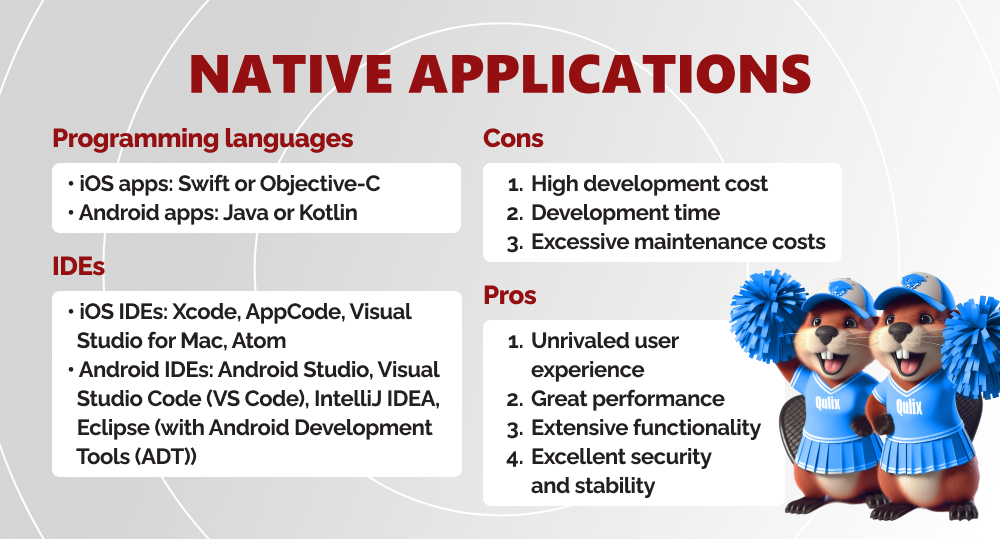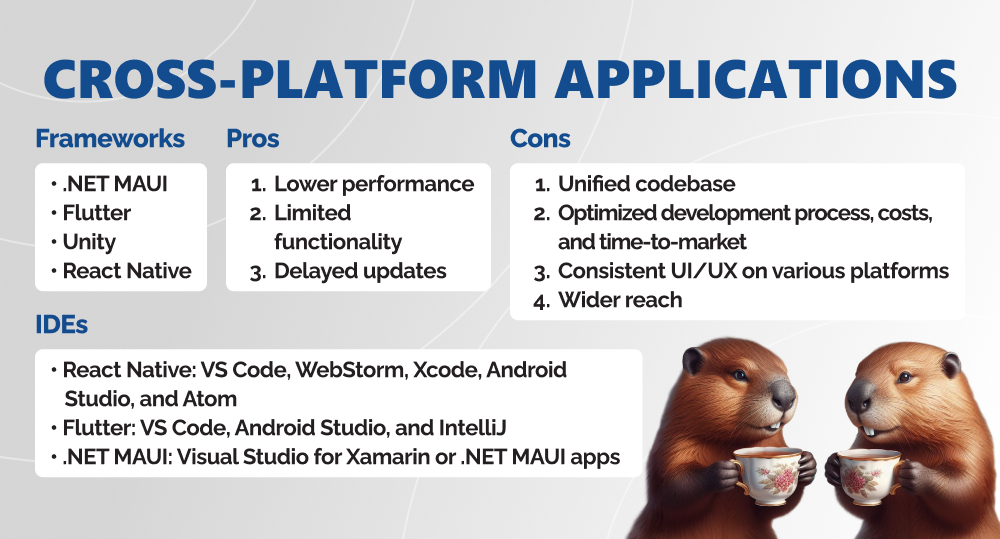Cross-platform vs. native app development: if you have ever thought of building an application, you know how torturous the choice is. You have the money and want to deliver a top-notch product, so native app development seems like your best bet. But why spend the bucks, if a cross-platform solution can do the job just fine? Or… can it?
The global mobile application market size is expected to reach USD 565.40 billion by 2030, expanding at a CAGR of 13.4% from 2022 to 2030 (Research and Markets). To ensure that you jump on this expansion wagon, we will guide you through the intricacies of both app building approaches. So keep reading to find out the pros and cons of cross-platform vs. native mobile development.
written by:
Vladislav Stanishevsky
Software Architect
Contents
Native vs. Cross-Platform Apps: Making Heads (or Tails?) of Definitions
It's all about the platforms you are developing an application for. Where do you want to run it?
- If it's a particular operating system, then we're talking about native mobile app development. That is, the app is going to be native to a certain environment, e.g., Android and iOS devices. Check out Spotify and WhatsApp: they look like they were on your iPhone even before Siri got there.
- If you want your application to throw two strikes with one pitch (that is, target multiple mobile platforms), then it’s cross-platform app development. With it, you can build just one app and run it on both Android and iOS platforms (or other operating systems, too, if you like). To give you an idea of the apps that fall into this category, we will name Skype and Bloomberg.
*By the way, if you're after mobile app developers, we have many seasoned professionals in the team. iOS, Android, or cross-platform and hybrid experts — you name it, and we'll assign the right people to your project.
Native Applications: What They Are Made Of, Pros and Cons
What Are They Made Of?
Let's start the first proper round of the battle “native vs. cross-platform app development” with listing languages and tools that developers apply to create native mobile apps.
Like we determined above, such solutions are built for a certain operating system, hence, you use platform-specific programming languages to get the job done:
- iOS apps: Swift or Objective-C;
- Android apps: Java or Kotlin.
To build native solutions, you will also require libraries, debuggers, and compilers (they make up platform-specific software development kits (SDK)), as well as an integrated development environment (IDE). IDEs are software that increases developer productivity. They can perform many tasks, e.g., write, compile, and debug code, monitor resources, etc.
- iOS IDEs: Xcode, AppCode, Visual Studio for Mac, Atom
- Android IDEs: Android Studio, Visual Studio Code (VS Code), IntelliJ IDEA, Eclipse (with Android Development Tools (ADT)).
Pros
#1. Unrivaled user experience
Regardless of the app development type, programmers must adhere to OS guidelines. Still, native applications inherit the feel and the look of a certain platform in its entirety as native systems provide UI components and a solution for creating applications right out of the box. Users can take advantage of OS-specific gestures and actions and enjoy easy navigation. E.g., if you're designing an iOS app, it will be impossible to distinguish it from what Apple builds itself.
Consequently, the UX of native apps is intuitive and seamless.
#2. Great performance
Due to the platform-specific design, many application components are preloaded, meaning the app merely pulls data from the Internet instead of fully loading every time. Additionally, the absence of an intermediary software level between the program and the operating system leads to a much faster and cleaner performance with fewer glitches.
#3. Extensive functionality
Native mobile apps provide full and direct access to all OS-specific APIs and tools. Available pre-set libraries and interface components provide developers with the opportunity of effortless interaction with everything the OS has to offer, be it camera, microphone, GPS, contact list, or even Siri and Face ID (if you're dealing with iOS). Native apps also provide offline functionality, as it is a lot easier for them to access internal storage.
If your goal is to build complex apps that involve a lot of data processing or video editing software, native app development is your best choice.
#4. Excellent security and stability
When it comes to the native mobile app vs. cross-platform mobile app security, the former can boast of a way better reliability than the latter. That is because with native mobile development, programmers can take advantage of built-in security features, like platform-specific file encryption, intelligent fraud detection, authentication, etc.
On top of that, Apple and Google continuously improve their platforms: they release updates with bug fixes and new features and publish SDKs to help developers put to use the recently added functionality. Hence, native apps get upgraded in a timely and hassle-free manner.
Cons
- High development cost. If you want to release both iOS and Android apps, you need to hire two separate development teams, as iOS and Android software engineers are professionals with entirely different expertise. Consequently, development costs double.
- Development time. Not only do you have to create two (or more) applications, there's also zero opportunity of code reusability (like we've established above, iOS and Android apps have nothing in common). You have to build two products from scratch separately.
- Excessive maintenance costs. Launching an app is only half the task. Maintenance is a significant part of the deal, and it might be challenging in regard to human, time, and monetary resources to support several native mobile applications at the same time. Studies show that the average maintenance costs of one application are 15–20% of the mobile app development cost. With two native apps, that is 30–40%.
Cross-Platform Applications: What They Are Made Of, Pros and Cons
What Are They Made Of?
Let's deepen our exploration of the subject “cross-platform apps vs. native apps” and move on to cross-platform mobile development. Like we determined in the first section of the article, its purpose is to target different platforms with the same code. To build apps of this kind, you need cross-platform development frameworks. In their turn, such frameworks rely on platform-specific SDKs from a unified API that help developers access necessary tools.
Popular cross-platform frameworks include:
- .NET MAUI (previously known as Xamarin). Its programming languages are C# and XAML.
- Flutter. Developers can use this cross-platform framework with the Dart programming language.
- Unity. This cross-platform framework natively supports C#.
- React Native. Despite its misleading name, this framework is your best bet if you want to build a superior cross-platform mobile application. As the Stack Overflow 2023 Survey states, React Native is the #1 development framework among professionals. Its programming language is JavaScript. According to the same study, “2023 continues JavaScript’s streak as its 11th year in a row as the most commonly-used programming language,” which bolsters React Native’s spread even further.
Creating a cross-platform mobile app for Android requires the Android SDK installed on macOS, Windows, or Linux. For iOS, the iOS SDK and Xcode are mandatory, along with a macOS device.
Here is the list of IDEs that align with the above-mentioned frameworks:
- React Native: VS Code, WebStorm, Xcode, Android Studio, and Atom.
- Flutter: VS Code, Android Studio, and IntelliJ.
- .NET MAUI: Visual Studio for Xamarin or .NET MAUI apps.
Pros
#1. Unified codebase
In the Queen song One Vision, Freddie Mercury had the line, “One heart, one soul, just one solution”. He didn't know that, but he sang about cross-platform mobile applications.
Unlike native development that entails separate native apps for iOS and Android, our cross-platform magic wand targets all required devices with only one project that can run on different mobile operating systems. So yes, a single development process, the same design and engineering teams working on an application, and just one solution to build and maintain (which is relatively easy, considering that developers need to deploy fixes and upgrades for the same code).
#2. Optimized development process, costs, and time-to-market
Code reusability of the cross-platform approach is the key to a fast development process and decreased time-to-market. Additionally, if juxtapose native vs. cross-platform mobile development further, development costs of the latter are significantly lower. All of this is especially handy if:
- you are a startup;
- you are on a tight budget;
- you need to launch an MVP (minimum viable product) to validate a product or a business idea;
- you want to target more users.
#3. Consistent UI/UX on various platforms
Here native and cross-platform solutions immensely vary: a native app from Apple App Store and a native app from Google Play Market will look unlike one another due to how dissimilar these OSes are. But with cross-platform development, it's a different story.
It is a huge win for people who use a variety of devices. Regardless of a mobile platform, they will enjoy the same interface and the same experience with the app. No need to relearn the flow or get accustomed to an unfamiliar design.
Also, when a cross-platform app undergoes visual rebranding, users can instantly spot that on every platform.
#4. Wider reach
According to statistics, as of 2023, Android had a 70.29% global market share (3.9 billion users) and targeted countries like India, Brazil, Mexico, etc. More than 20% of the market are occupied by iOS (more than 1.40 billion people). Still, studies show that iPhone users have a 43.7% higher average salary than Android users, and they are mostly located in the U.S., Japan, and Canada. What is our point, you may ask? By opting for just one platform, you risk missing out on selling opportunities for very wide and diverse target audiences. But if you choose both, you get to expand your brand's market presence and increase income.
Cons
- Lower performance. To run on a specific device, a cross-platform app has to “talk” to platform-specific services. This creates an extra abstraction layer and a rendering process which slow down the solution.
- Limited functionality. Because cross-platform apps have to work identically on different platforms, developers omit certain OS-specific features. The side effect of this unification is limitations to the apps' look and technical capabilities. Additionally, cross-platform frameworks don't always grant developers full access to native APIs and features. The implementation of unique OS capabilities might simply be restricted.
- Delayed updates. Remember we talked about how Google and Apple constantly improve their platforms, and how native app developers instantly get SDKs to speed up the upgrade of their solutions? Cross-platform mobile apps don't have that. Publishers have to wait for a separate update to enhance their products.
Сross-Platform App Development vs. Native App Development: Who Wins?
Now that we know a few facts about each of the development types, it is time to determine who will bear the palm.
- Performance and speed. For an industry like fintech or healthcare, superior security features and high indicators of performance and speed are a must. A native mobile application easily checks these boxes. Cross-platform app development can handle solutions without complex logic or animation.
- UI/UX capabilities. Despite the fact that the victor of this round of the native vs. cross-platform development contest might seem obvious, we can't make a pick. Yes, native mobile apps are a gateway to unique features of a specific platform as well as its resources and services. Due to that, they deliver superb UI/UX experiences. But if you build a simple cross-platform app, it will impress you with its responsiveness. After all, games are mostly built on Unity, a cross-platform framework. It proves that these solutions can deliver an outstanding experience, too.
- Development time and cost. Cross-platform apps require considerably less time to build and one development team, which is a financial blessing. These apps are perfect if you a) plan to target multiple platforms with one solution, b) are in a rush, c) are on a budget. Still, if you can afford separate apps for different mobile devices, and you have time and money for this endeavor, it is worth giving native apps a shot.
- Reach. Another clean victory in the native vs. cross-platform development competition. This time, it’s the latter contestant. According to statistics, 79% of consumers are more likely to purchase products if the brand provides a consistent experience across devices. Hence, if it is vital for your business to offer that kind of interaction and to reach people across different operating systems, no one can do the job better than cross-platform development.
- Testing and maintenance. Cross-platform apps use the same codebase, which is why it is a lot easier, a lot cheaper (one dev team, remember?) and a lot faster to test a hypothesis or a prototype, debug, or update them. At the same time, when Apple or Google launches OS updates, native apps get instant support, while solutions for multiple operating systems have to stand in line for an upgrade without clear migration or upgrade paths. What can we say? In this round of the battle of a cross-platform vs. native application, it is quite hard to determine a winner.
Choosing an appropriate mobile app: native vs. cross-platform solutions
Native apps
Cross-platform apps
Performance and speed
Best suited for complex solutions and offer optimal performance.
Lower speed and performance. Perfect for simpler solutions.
UI/UX capabilities
Unrivaled UI/UX due to the access to the capabilities of a native OS.
Apps are less responsive and have fewer features.
Development time and cost
Require separate development teams for separate platforms, which impacts the project length and cost.
One development team, fast time-to-market, lower costs.
Reach
If you target only a specific platform, you'll miss out on marketing and selling opportunities that other mobile devices offer.
Allows to reach customers across multiple platforms, which positively affects the brand image and sales rates.
Testing and maintenance
Local fixes and maintenance are more complex and time-consuming, yet major OS-specific upgrades are well-supported.
Local fixes and maintenance are easy and fast, but major OS-specific upgrades take time.
Between a Rock and Hard Place, Aren’t We?
Mobile native vs. cross-platform mobile app development vs. native app development vs. cross-platform vs. native development… It might seem that there is no way out of this vicious circle of app development, and you're stuck in the agony of choice. Still, if you keep your eye on priorities, you will discover that the job is easier than you assumed. What is your target audience? What is your project timeframe? And, of course, what is your budget? If you get answers to these questions straight, you will determine the solution that wins in the battle of a native app vs. cross-platform app on the spot.
And if you're on the look-out for a professional and reliable business partner to accompany you on the path of mobile app development, we're happy to offer you our services. Contact us, and we'll schedule a consultation with our top engineers and business consultants ASAP.
Valuable Insights
Native app development offers solutions for specific operating systems. It means that if you want to build a native application for iOS, this app will be capable of running just there. If you decide to expand and cover Android devices too, you would need to build a separate application for that OS, hence hire another development team. Native apps offer exceptional performance, speed, and excellent UI/UX, still, development time and costs are high.
Cross-platform app development encapsulates several platforms with one application. That is very convenient for businesses that are aiming for a wide reach without spending a lot. Cross-platforms programs have a shorter time-to-market, and they are cheaper as you require only one dev team for the app. These solutions are easier and less expensive to maintain because you're working with a single product.
If you want to launch an MVP for a product or a business idea as soon as possible or target more users, it definitely is your best bet.
Still, to determine the optimal development type for your solution and estimate approximate development costs, we invite you to schedule a free consultation with us. We will discuss your project requirement, budget, and help you make the right choice.
It depends on the product that you want to build. If that’s a simple piece of software, a cross-platform application is enough to implement the task. But for complex products (that target video editing or charts), it is best to use native solutions.
Here is a brief comparison of native vs. hybrid vs. cross-platform applications.
Native apps are crafted for specific platforms. Out of the three, they offer the best performance indicators, but their disadvantages include high cost and a lengthy dev process. Hybrid app development blend web apps with native components. As a result, they provide cross-platform compatibility but may negatively impact performance. Last but not least, cross-platform apps use frameworks like React Native or Flutter. They make it possible to reuse code across platforms with varying degrees of native performance and integration. This is how native vs. cross-platform vs. hybrid apps differ.

Contacts
Feel free to get in touch with us! Use this contact form for an ASAP response.
Call us at +44 151 528 8015
E-mail us at request@qulix.com









